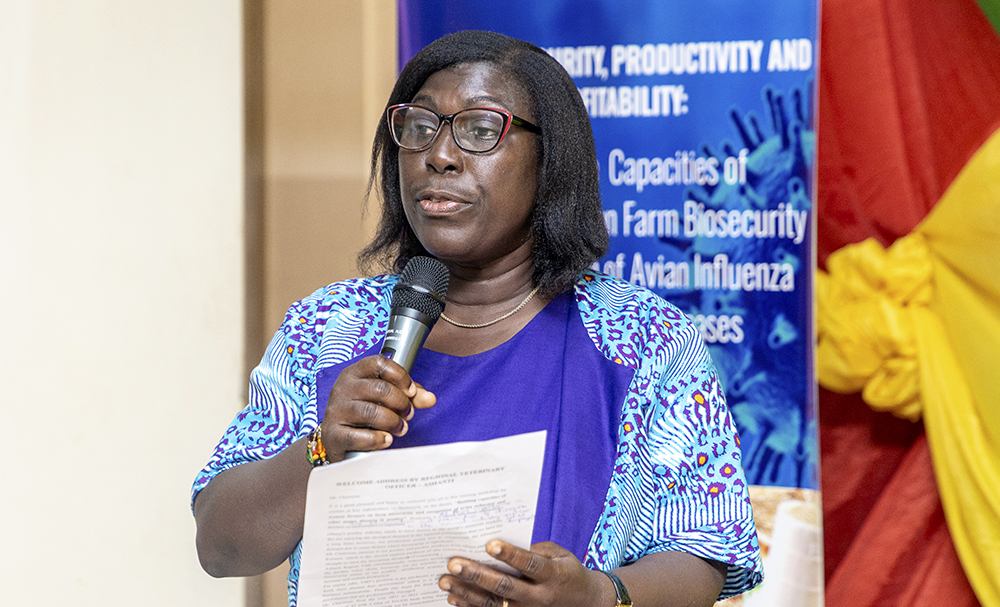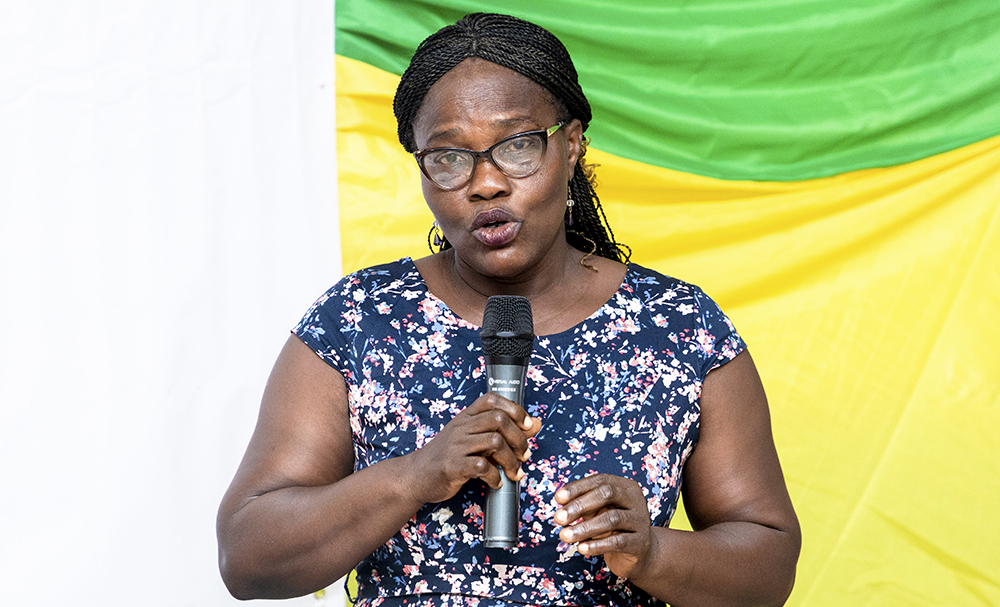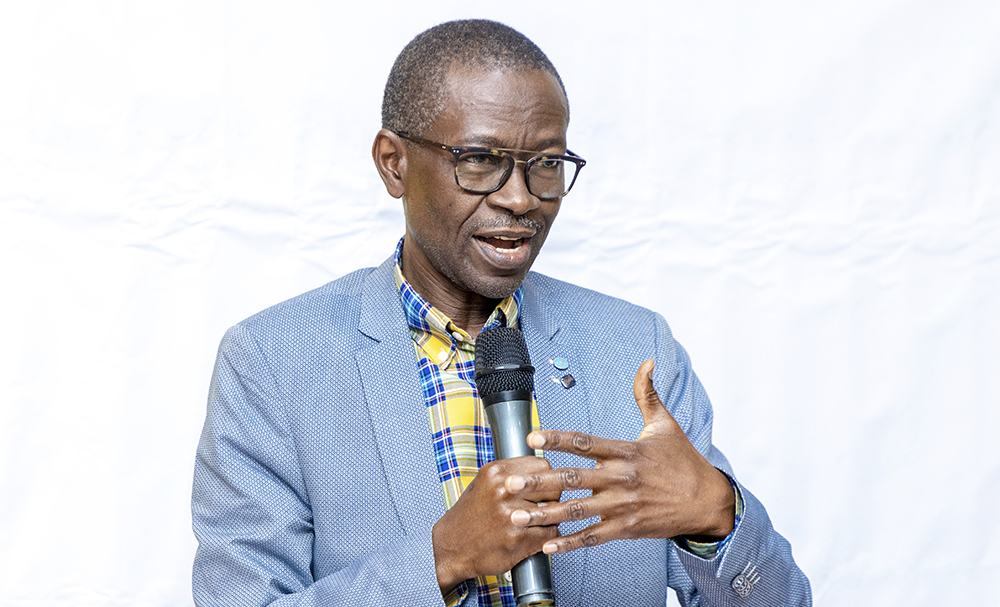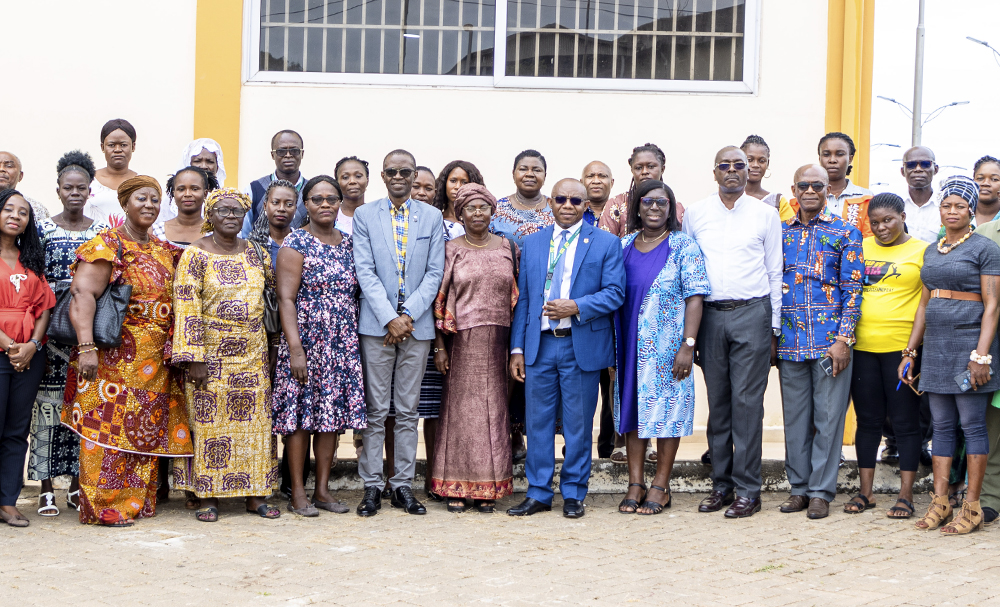Women farmers drawn from all over Ghana have undergone training in farm biosecurity, productivity, and profitability. The training is through the collaborative efforts of the School of Veterinary Medicine (SVM) of the Kwame Nkrumah University of Science and Technology (KNUST), Kumasi, the Food and Agricultural Organisation (FAO) of the United Nations, and the German-West African Centres for Global Health and Pandemic Prevention (G-WAC).
The workshop was on the theme: “Building the Capacities of Women Farmers on Farm Biosecurity and Recognition of Avian Influenza (AI)and other Major Diseases in Poultry.”

In her welcome address, the Regional Veterinary Officer, Dr. Mabel Abudu, stated that building the capacities of women on-farm biosecurity and recognition of avian influenza and other farm diseases is of prime importance in eliminating and preventing diseases in the animal industry.
Dr. Abudu said Ghana’s poultry industry needs to have access to the world’s premium markets. “We are enjoying the strongest demand in the internal marketplace that we have had for a long time. However, our production seems low to compensate for the consumer’s demand due to some factors where biosecurity is significant,” she said. According to her, the Ashanti Region is the highest producer of poultry and poultry products, and if it is to increase profitability and sustain production, then the biosecurity status of poultry should be protected.
She noted that the Veterinary Services Division’s (VSD) position is for producers to produce clean, safe, healthy food from a healthy environment. She revealed that from 2021 to 2023, the region has had 36 outbreaks of AI with a total of Three and Fixity-Two Thousand and Thirty-Six (352,036) birds being depopulated to contain the disease. Most of the farms could not be revived and some farmers went into debt and others were unemployed.
Dr. Mrs. Abudu continued that field observations from the affected farms revealed poor or no biosecurity measures. Some of the diseases that affect farm animals are fungal, bacterial, and parasitic, among others. All these problems can be averted if biosecurity measures are effectively optimised.
According to Fenteng Danso of the VSD, the three-day workshop will take the form of PowerPoint presentations, group discussions, and plenary sessions on the biosecurity classification system developed. Participants will also embark on field visits to KNUST Poultry farms, Olympio Hatchery, and some farms within the environs of Kumasi.

Representing the Women in Poultry Value Chain in Ghana, Mavis Nketsiaba Wobill, commended organisers for seeing the need to train women. Ms. Wobill said her group has Nine Hundred (900) registered members. Before coming together most women in the poultry value chain were struggling to solve problems in the poultry sector, however, coming together and attracting help from stakeholders have helped tackled their problems from a holistic approach, she added.

Provost of the College of Health Sciences (CoHS), Professor Christian Agyare noted that more than a decade ago, KNUST recognised the “One Health Concept” and saw the need to establish the SVM in the CoHS. Professor Agyare said it is alarming to hear people’s investments going down the drain, so it is timely that the workshop is being organised to help educate everyone in the poultry value chain. He advised the women to help impart the knowledge to their peers after the training.

Given the objectives of the workshop, Dr. Garba Ahmed of the FAO said biosecurity issues have an ever-increasing profile on a global basis due to a range of factors including international trade in animals and their products and changing human behaviour. Ghana is not new to livestock diseases and various steps taken to address some of the challenges are yet to be consolidated.
Dr. Ahmed stated that in recent times, the threat to the poultry industry in Ghana is Avian Influenza, which if not controlled can become endemic. The first occurred in 2007. In response to the outbreaks, Dr. Ahmed disclosed that the Veterinary Services Division (VSD) of the Ministry of Food and Agriculture (MoFA) developed a biosecurity classification system for the poultry sector, based on the FAO classification of poultry farms to control further outbreaks and spread of AI and other animal health issues. The composite training manual for the biosecurity guidelines for poultry, piggery, and aquaculture will be used to train stakeholders in on-farm biosecurity in these sectors. Efforts to continue to improve biosecurity remain paramount to the prevention and control of diseases in the poultry, piggery, and aquaculture industry in Ghana.
In his presentation, Former Dean of the SVM, Professor Raphael Deladem Folitse, said 50% of all germs in poultry farms are carried by humans into farms. Humans are, therefore, important in treating animal diseases. He advised the participants not to allow visitors to move to and from their farms. He said farmers should ensure the egg vendors and meat vendors who patronise their products adhere strictly to the rules and regulations to prevent or reduce the spread of diseases.
In addition, eggs should be sold outside the farms. Workers should be provided uniforms or protective wear and entrances of farms should have disinfected footpaths.

















